【DELF B2 Preparation】🌍What Is “L’aide Humanitaire” Learning French From 1jour1actu
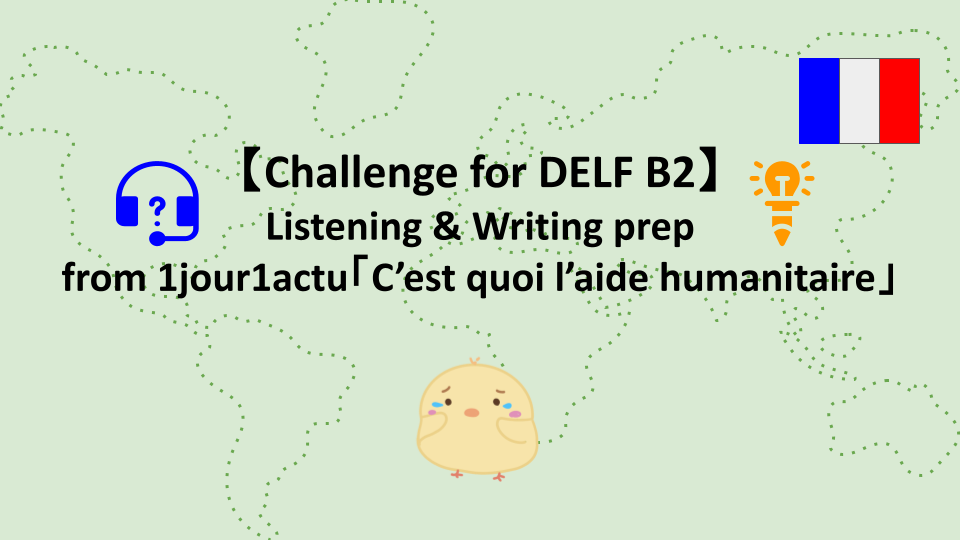
This post is 6 minutes read time. Aiming for studying by just reading!
My DELF B2 Preparation Blog – Listening & Writing Practice
Learning French Through Real Topics: “C’est quoi l’aide humanitaire ?” – 1jour1actu
L’aide humanitaire, or humanitarian aid, refers to emergency support provided to people affected by exceptional crises—such as natural disasters, war, famine, or epidemics.
It includes essential supplies like food, water, medical care, and shelter, often delivered quickly and without discrimination.
Humanitarian aid is usually organized by NGOs (ONG in French), international institutions like the UN or EU, and national governments, and is based on the principle of helping regardless of nationality, religion, or politics.
This topic often appears in the DELF B2 writing and speaking sections, especially when discussing themes such as:
- international solidarity,
- global responsibility,
- and ethical action.
In this article, you will learn:
- key vocabulary and idioms to speak and write fluently,
- essential grammar structures often tested at B2 level,
- and how to write your own opinion using advanced expressions.
At the end, there’s a mini quiz to check your understanding—so read on and test your skills!
🔸Key Sentence Breakdown|Let’s read and understand the original
L’aide humanitaire est une façon de venir au secours de populations victimes d’une crise exceptionnelle.
Translation:
Humanitarian aid is a way to help populations who are victims of an exceptional crisis.
Grammar & Vocabulary Tips:
- venir au secours de = to come to the aid of (fixed expression)
- victime d’une crise = victim of a crisis
- crise exceptionnelle = a severe or unusual crisis (war, natural disaster)
- une façon de = a way to / a method of — useful for essays to introduce purposes or methods
This sentence sets the tone for understanding humanitarian action.
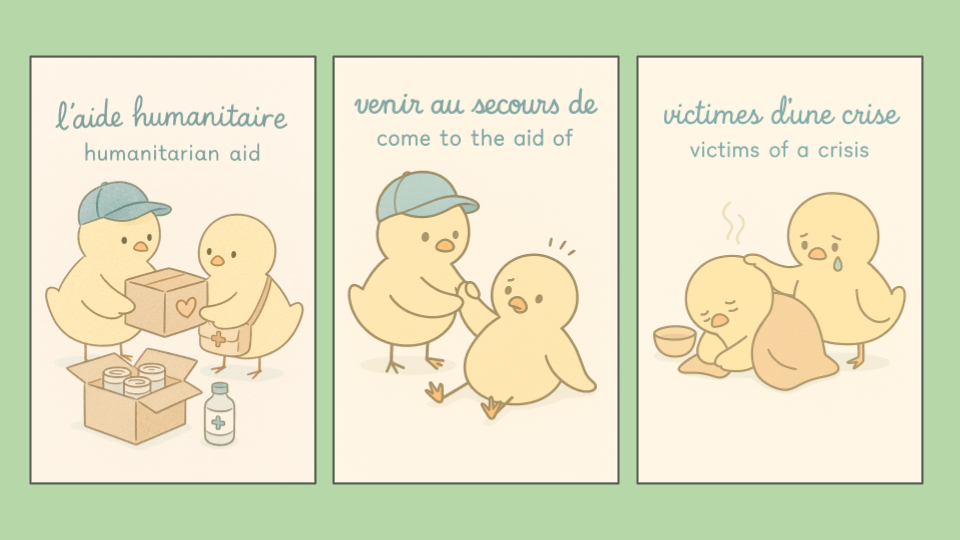
📚Vocabulary Boost
| French | English | Notes |
|---|---|---|
| l’aide humanitaire | humanitarian aid | Main topic |
| une catastrophe naturelle | natural disaster | ex. séisme (earthquake) |
| un don | donation | faire un don = to donate |
| marchandises | goods, supplies | in this context: relief materials |
| équipement de première nécessité | basic necessities | e.g. water, food, clothing |
| provenir de sources nationales | to come from national sources | also used with “internationales” (international sources) |
| une ONG | NGO (non-governmental organization) | abbr. of organisation non gouvernementale |
| laïque | secular | ≠ religieux (religious) |
| sans distinction de nationalité | regardless of nationality | great essay phrase! |
| les populations en détresse | populations in need/distress | often used in humanitarian context |
🔧 Grammar Focus | Key Structures for B2
Here are four powerful grammar structures frequently used at the B2 level. Mastering them will help you sound more natural and sophisticated in both written and spoken French.
1. Il est nécessaire que + subjonctif
This construction expresses necessity, obligation, or importance. It is always followed by the subjunctive mood because it introduces a subjective judgment.
Structure: Il est [adjectif] que + sujet + verbe (au subjonctif)
Example: Il est nécessaire que l’aide soit rapide.
→ It is necessary that the aid is fast.
More examples:
- Il est important que tout le monde agisse vite.
→ It is important that everyone acts quickly. - Il est urgent que nous aidions les victimes.
→ It is urgent that we help the victims.
2. Sans + nom, + conditionnel
This structure expresses a hypothetical situation or consequence in the absence of something. It’s very useful for cause–effect relationships in essays.
Structure: Sans + nom, sujet + verbe (au conditionnel)
Example: Sans l’aide internationale, beaucoup de gens seraient en danger.
→ Without international aid, many people would be in danger.
More examples:
- Sans coordination, l’intervention serait inefficace.
→ Without coordination, the intervention would be ineffective. - Sans médecins, les blessés mourraient rapidement.
→ Without doctors, the injured would die quickly.
3. jouer un rôle + adjectif
This idiomatic expression is used to describe how important or central someone or something is in a particular context.
Structure: jouer un rôle + adjectif
Example: Les ONG jouent un rôle essentiel.
→ NGOs play an essential role.
More examples:
- Les citoyens jouent un rôle important dans la solidarité.
→ Citizens play an important role in solidarity. - L’État joue un rôle clé dans l’organisation de l’aide.
→ The State plays a key role in organizing aid.
4. une façon de + infinitif
This phrase introduces a method or a way of doing something. It’s great for describing goals, actions, or strategies.
Structure: une façon de + verbe (à l’infinitif)
Example: L’aide humanitaire est une façon de venir au secours des populations en détresse.
→ Humanitarian aid is a way of helping people in distress.
Also useful:
- une manière de + infinitif (a manner of)
- un moyen de + infinitif (a means of)
More examples:
- Participer à une collecte de dons est une façon d’aider les gens.
→ Taking part in a donation drive is a way of helping people. - Sensibiliser les jeunes est une manière de préparer l’avenir.
→ Raising awareness among young people is a way to prepare for the future.
📘 Essay Expressions | Write Like a B2 Candidate
Here are ready-to-use phrases to enhance your writing:
- À mon avis, l’aide humanitaire est une responsabilité collective.
(In my opinion, humanitarian aid is a collective responsibility.) - Il est important que les États coopèrent avec les ONG.
(It is important that states cooperate with NGOs.) - L’aide doit être apportée sans distinction de nationalité.
(Aid must be delivered without regard to nationality.) - Sans solidarité internationale, les victimes resteraient sans soutien.
(Without international solidarity, victims would be left unsupported.)
🖋️ Practice Writing | Short Essay Prompt
Prompt: Pensez-vous que l’aide humanitaire devrait être une responsabilité individuelle ou collective ?
(Do you think humanitarian aid should be an individual or collective responsibility?)
Model Answer (excerpt):
À mon avis, l’aide humanitaire est un devoir collectif. Il est essentiel que les gouvernements, les ONG et même les individus collaborent pour répondre aux urgences. Sans cette collaboration, une aide efficace serait presque impossible.
Translation:
It is essential that governments, NGOs, and even individuals work together to respond to emergencies. Without this collaboration, effective assistance would be nearly impossible.
✅ Test Yourself | Final Quiz
1. How do you say “regardless of nationality” in French?
- a) avec distinction de culture
- b) sans distinction de nationalité
- c) malgré leur langue
2. Which sentence uses the subjunctive correctly?
- a) Il est nécessaire que les gens ont de l’eau.
- b) Il est nécessaire que les ONG soient présentes.
- c) Il est nécessaire de aller là-bas.
3. Translate: “If there were no aid, many people would be in danger.”
Answers
- b) sans distinction de nationalité
- b) Il est nécessaire que les ONG soient présentes.
- Sans aide, de nombreuses personnes seraient en danger.
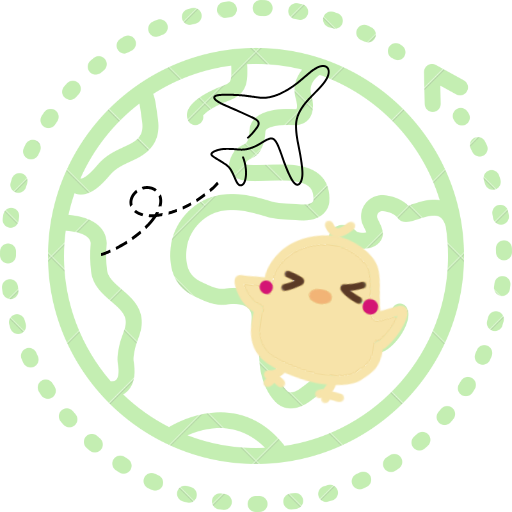

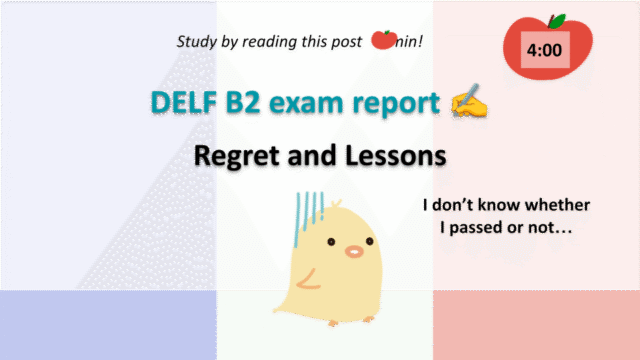
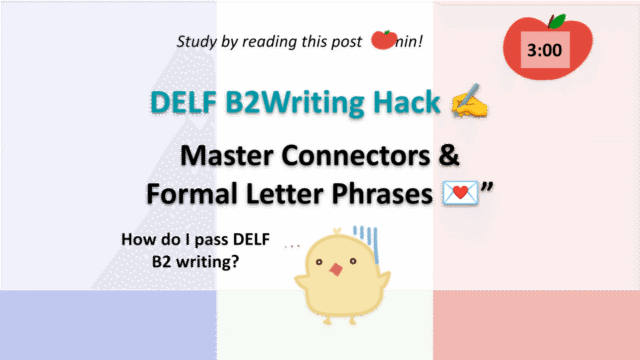
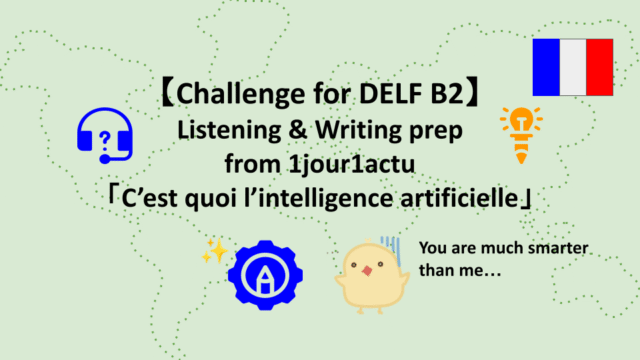
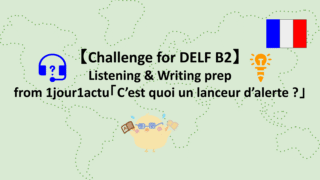
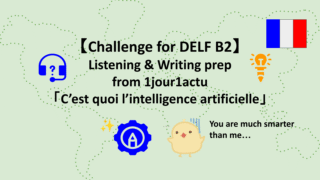


Leave a Reply